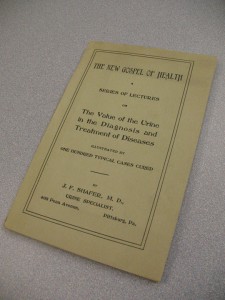The New Gospel of Health: A Series of Lectures on the Value of the Urine in the Diagnosis and Treatment of Diseases is a unique book written by Pittsburgh physician John F. Shafer. It was published in the first decade of the 20th century to advertise the medical practice of Dr. Shafer, a self-styled “urine specialist,” and to guide patients in their choice of physicians.
 The book includes descriptions of 100 cases illustrating Shafer’s use of urine analysis in the diagnosis and treatment of many illnesses. The catalog of cured ailments ranges from gall stones and jaundice, to ailments such as “tobacco heart.” He assembled these cases with one goal in mind: to share tributes from his patients about the benefits of his diagnostic method. He claimed that the only measurable proof of physician success is a cured patient willing to give testimony about a doctor’s effectiveness. Long before HIPAA regulations protecting patient privacy, Shafer managed to secure his patients’ permission to publish their testimonials to prove his claim. Therefore, all the described cases include detailed observations leading to diagnosis and treatment, and the patients’ testimonials with full names and addresses, so they could be contacted to verify the printed word.
The book includes descriptions of 100 cases illustrating Shafer’s use of urine analysis in the diagnosis and treatment of many illnesses. The catalog of cured ailments ranges from gall stones and jaundice, to ailments such as “tobacco heart.” He assembled these cases with one goal in mind: to share tributes from his patients about the benefits of his diagnostic method. He claimed that the only measurable proof of physician success is a cured patient willing to give testimony about a doctor’s effectiveness. Long before HIPAA regulations protecting patient privacy, Shafer managed to secure his patients’ permission to publish their testimonials to prove his claim. Therefore, all the described cases include detailed observations leading to diagnosis and treatment, and the patients’ testimonials with full names and addresses, so they could be contacted to verify the printed word.
Dr. Shafer advertised himself as a founder of “urinopathy,” a term he coined in 1891 to describe a new method of diagnosis and treatment by urine based on his own research and discoveries. He promoted this new technique as a more effective way of reaching diagnosis than the traditional method that looked at symptoms and not causes. His practice was based in Pittsburgh, where he offered office consultations and the services of the Shafer Pathological Laboratory. He also advertised the availability of his services to all who wanted to send their urine through the mail, and receive analysis, diagnosis and treatment of their ailment.
Because most of the cases were from Pittsburgh and vicinity, the book is also of interest to local researchers, as an interesting portrayal of health problems in this area a hundred years ago.
The Falk Library Rare Books Collections contain over 4,000 rare books in the health sciences dating back to 1496. All of the books can be located in the PITTCat for the Health Sciences by author or title.
~ Gosia Fort